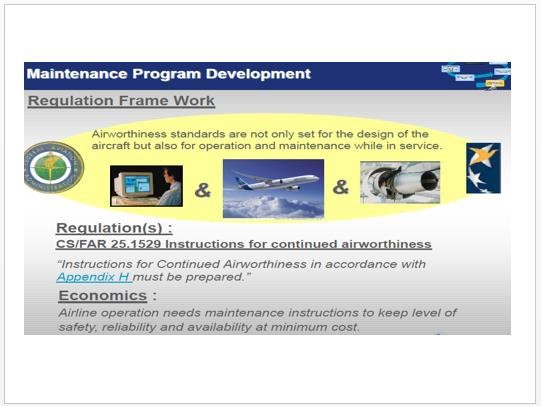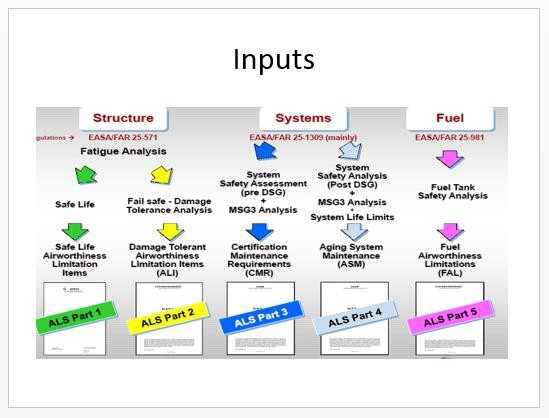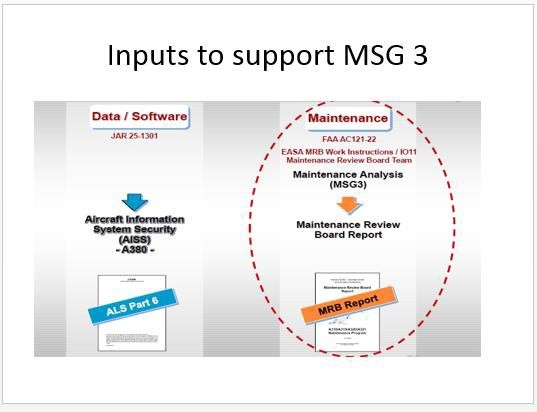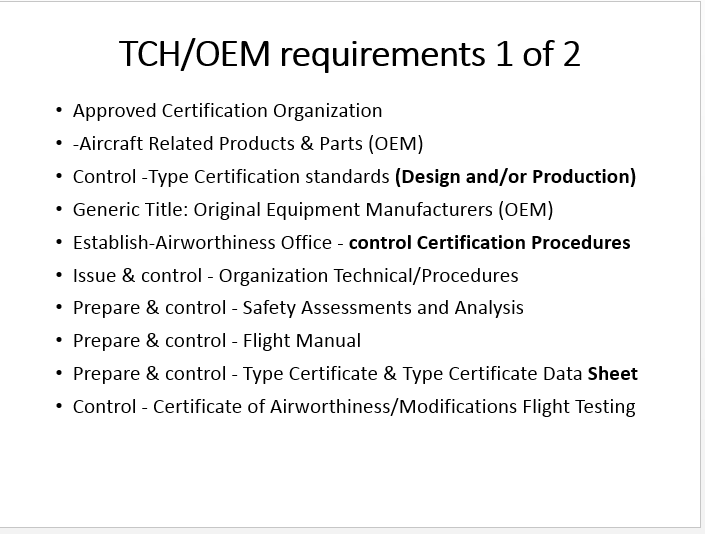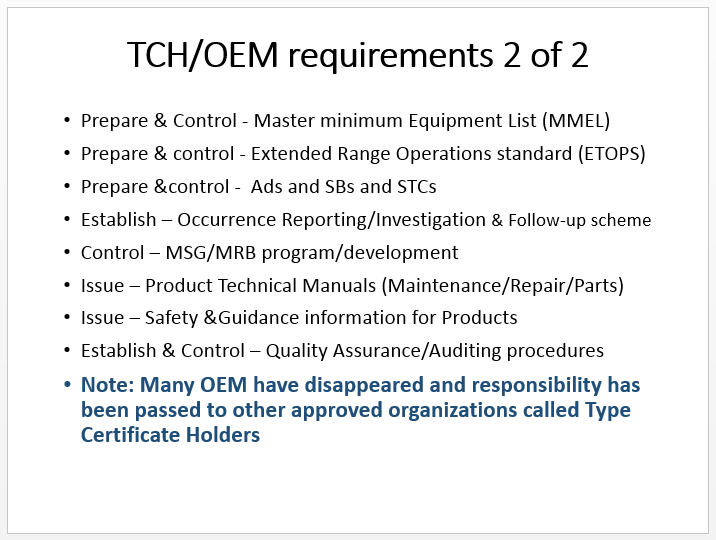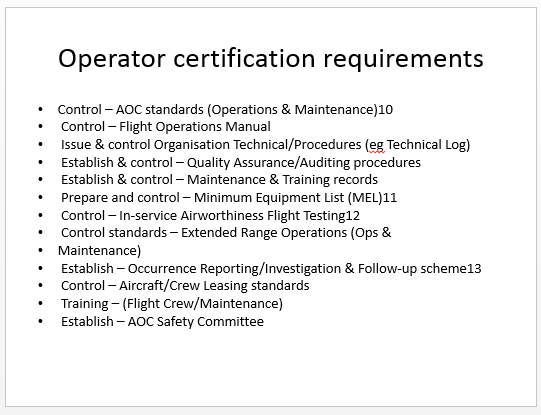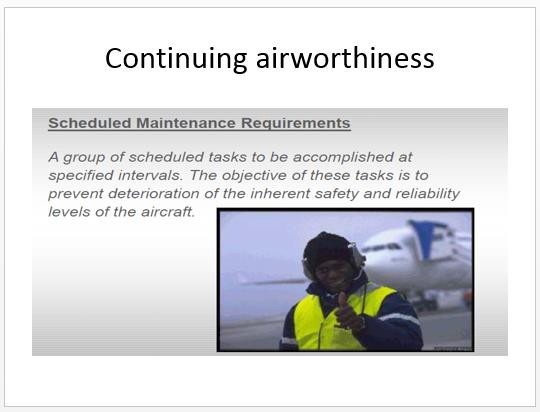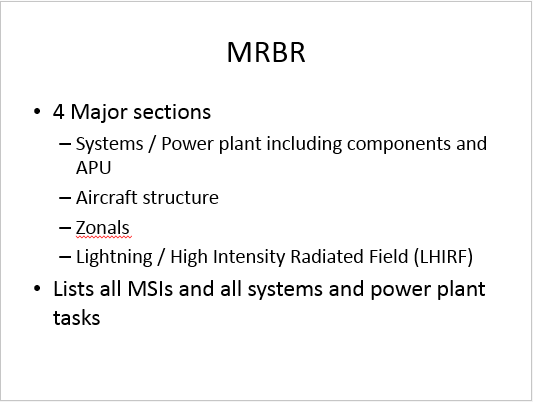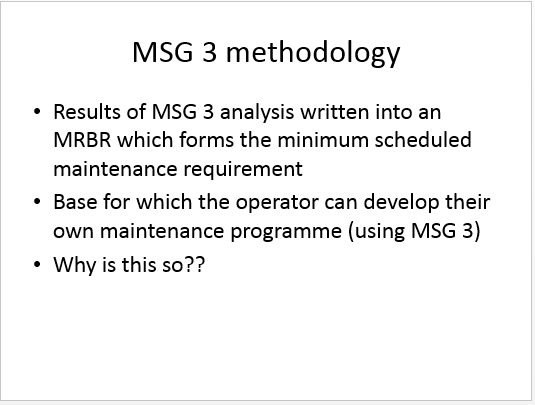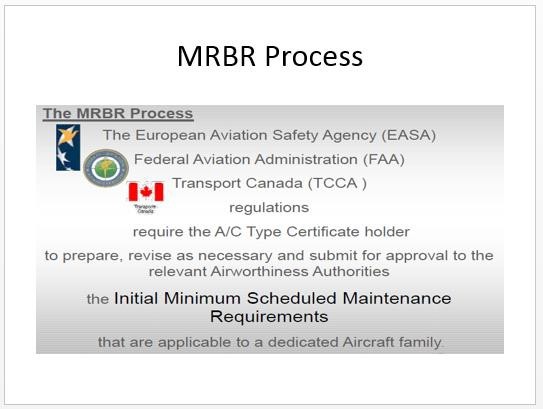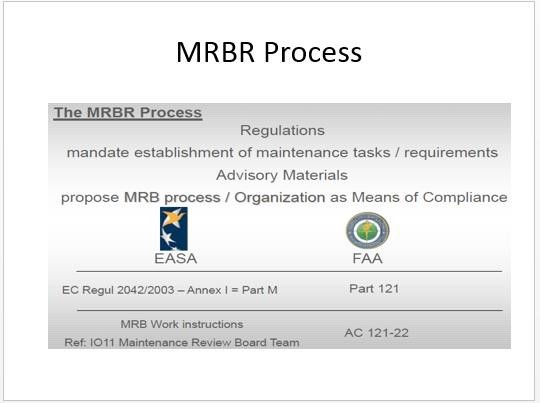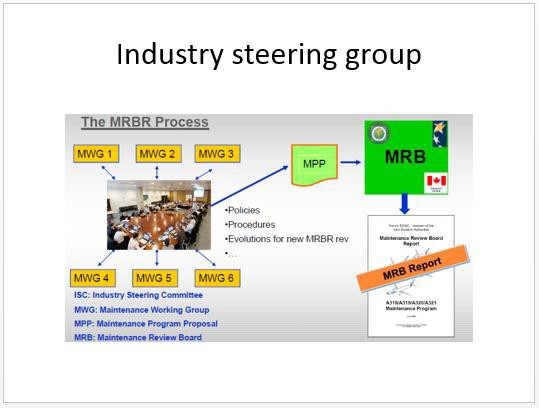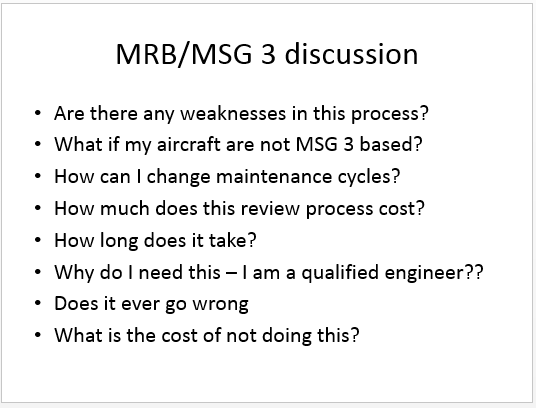Course # 251 –
Maintenance Steering Group (MSG-3) Course
Maintenance Steering Group – 3 (MSG-3) has been a key to ensure up-to-date engineering logic in aviation maintenance today. Compared to its predecessors, it’s top-down approach provides more benefits to derive the most appropriate scheduled maintenance task and interval for an aircraft’s major components and structure. MSG-3 based maintenance effectively delivers a significant improvement of aircraft availability & operational safety nets while optimizing costs of ownership.
With the latest content and informant, this course aims to provide its participants with a sound foundation on the MSG-3 process and developing MSG-3 based Maintenance Programs.
This will be achieved by initially understanding MSG-3s historical development and comparative advantages over MSG-2 and MSG-1. This will be followed by a discussion on the reliability and failure characteristics theory to understand the MSG-3 logic and then proceed to address the components of the MSG-3 methodology. There will also be focused sections on MSG-3 specifics (SSI, Zonal Maintenance, L/HIRF, etc) Case studies, class exercises and workshops are also incorporated to effectively demonstrate the lessons and practical applications of the specific subject matter.
Course Objective
This course will comprise of 3-day presentation, discussion and intensive training on the background, requirement scope and application of MSG-3 Analysis Methodology. It aims to help participants in:
- UNDERSTANDING the technical and management issues of pertinent to MSG-3
- ENABLING competence to understand, support and conduct MSG-3 analysis
- DETERMINING sound information on the inherent safety and reliability levels of equipment
- APPLYING MSG-3 Analysis Recommendations to achieve optimal balance on maintenance/failures costs and availability & safety improvement.
Who should take this training:
Managers / Engineers / Materials Scientists / Inspectors / DERs in:
|
|
|
|
|
|
|
|
|
|
|
|
|
|
|
|
|
|
|
From Industries including but not limited to:
|
|
|
|
|
|
|
|
|
|
|
|
|
|
Training Syllabus:
Day 01 – AM
Introduction and MSG-3 Defined
This module explains the requirement for and describes a brief history of MSG-3. The meaning of Key MSG-3 terminology is explained and an overview of the MSG-3 process is described. The major differences between MSG 3 and MSG 2; the shortfalls of MSG 2 and what is required to transition from an MSG 2 MRBR to an MSG 3 MRBR.
The Failure Process
This module describes the reliability theory necessary for an understanding of MSG-3 and explains the meaning of key Reliability theory terminology. The module also describes the basis of engineering failures and how this influences maintenance decisions and explains the meaning of key engineering failure terminology.
MSG-3 Maintenance Significant Item Selection
The Maintenance Significant Item (MSI) selection process is introduced and the purpose of the activities, which occur in an MSI selection process, is covered with an explanation of the meaning of key MSI terminology.
MSG-3 Functions – Failures – Effects – Cause Sheet
In order for the MSG-3 Analyst to fully appreciate the reason for and the requirements of Functions – Failures – Effects – Cause Sheet, it is necessary to fully understand the principles behind this technique.
This module identifies the details of a Functions – Failures – Effects – Cause Sheet in relation to MSG-3 and shows the inspector how to interpret this information once collected. After all, information is of little use if it is ignored or misinterpreted. The activities necessary to organize equipment for MSG-3 analysis are also explained along with meaning of key MSG-3 terminology relating to this stage of the analysis.
There is a significant practical element to this module.
Day 01 – PM
Workshop #1: Maintenance plan cycle – This workshop will include maintenance requirements process flow, OEM certification requirements, and operator certification requirements.
Split into 2 groups, with attentive individual guidance from instructor, delegates will be asked to brief the other group on the issues that they see with the MSG/MRB process, including some of the difficulties they may have in getting information from various parties, each group will represent interested parties i.e. ISC, FAA, OEM/TCH or similar.
Tasks will be written for each group on whiteboard or flip chart.
MSG-3 Maintenance Tasks
This module lists and describes the types and characteristics of MSG-3 Preventive Maintenance tasks and explains the meaning of key Preventive Maintenance terminology.
Workshop #2- Maintenance plan development – This workshop will include MSG-3 methodology, MRB process and an MRB / MSG-3 methodology discussion forum.
Working as a group or groups the inspectors will be tasked to determine the MSI list from a small selection of items, given an operating context, and state how these items will be analyzed and fed into an MRB and MPD, then a series of open questions as provided previously. This will allow the ASI’s to get an understanding of the issues surrounding the MSG 3 process.
Actual commercial aircraft items will be provided; each task will be written onto a whiteboard or flip chart.
Day 02 – AM
MSG-3 Task Selection
Appreciate and describe in detail the basis of preventive maintenance task preference, evaluation and selection. There is a significant practical element to this module.
MSG-3 Structural Maintenance Analysis Procedure
Structure design philosophy, the procedure for analyzing and determining structural maintenance requirements and the meaning of structural maintenance terminology are addressed in this module.
Workshop #3- Maintenance plan documentation – This workshop will include maintenance review board report, maintenance planning document, and scheduled maintenance requirements document.
Still seated in a U formation, the students will be allocated into two groups. With attentive instructor guidance, they will describe data elements that are required for the MRB and how these relate to the MPD, especially for MPDs relating to A through D checks. The Inspectors will gain an understanding of task packaging and scheduling and why certain tasks are carried out when they are, and where to find which document they should be using. Instructor will offer individual guidance.
To conclude, a series of tasks will be provided, delegates will as a group or groups be asked to package and derive an MPD using available data.
Task will be clearly written up on whiteboard or flip chart.
Day 02 – PM
Zonal Maintenance Analysis Procedure
This module covers the principles behind Zonal Maintenance and explains the meaning of Zonal Maintenance terminology. The ATA iSPEC 2200 Standard for Zonal Plans is covered.
Lightning / High Intensity Radiated Field (L/HIRF) Analysis Procedure
Lightning / High Intensity Radiated Field (L/HIRF) analysis is established in the aviation industry as dedicated maintenance to reduce the possibility of single failure cause and occurrence of common failure cause across redundant channels and L/HIRF causing aircraft airworthiness implications.
This module provides an overview of the analysis procedure used to determine L/HIRF maintenance requirements.
Day 03 – AM
MSG-3 – Foundation
Implementing MSG-3 & Age Exploration
This module addresses the problems associated with producing the MSG-3 derived task recommendations into a workable Preventive Maintenance program and looks at the finer points of management relating to the MSG-3 effort.
If MSG-3 is to be the success it should be, it is vital that the project is properly controlled. This must start at the very first approaches to MSG-3 and continue right through the analysis and subsequent implementation of the maintenance program. Properly implemented MSG-3 will certainly reap benefits for any organization because it will develop a scheduled maintenance program, which will be focused and optimized for the aircraft equipment in its operating context.
This should have the advantage of reducing the overall cost of maintenance, Preventive and Corrective. The activities necessary to implement and sustain an MSG-3 analysis program are addressed along with the principles of an Age Exploration program.
Results from a complete MSG-3 analysis for Systems/Powerplant, Structures, and Enhanced Zonal Inspections will be given. The student will learn how those results are applicable to Certified Maintenance Requirements (CMRs), Airworthiness Limitations, Life Limits, and CAMP, the Continuous Airworthiness Maintenance Program.
Advisory Circulars and FAA Orders will be used in examples.
Day 03 – PM
Workshop #4- Maintenance plan optimization – This workshop will include IMRBPB Issue paper #44 implications on OEM, operators, and regulatory authorities.
Using whiteboards, two groups will be given scenarios, with fictional data, where items have been in service for a number of years, they will describe what data and what decisions they need to take to escalate or reduce the task frequency, including no faults, arising trends and in service serious faults.
Each group will be asked to discuss the risks taken when deferring or extending maintenance tasks, and why we carry tasks out without finding anything for years.
Each group’s task will be presented on a flipchart or whiteboard.
MSG-3 Summary and Conclusion
A DETAILED summary of the key points of the course, discussions with the student-inspectors, and course Conclusion.
